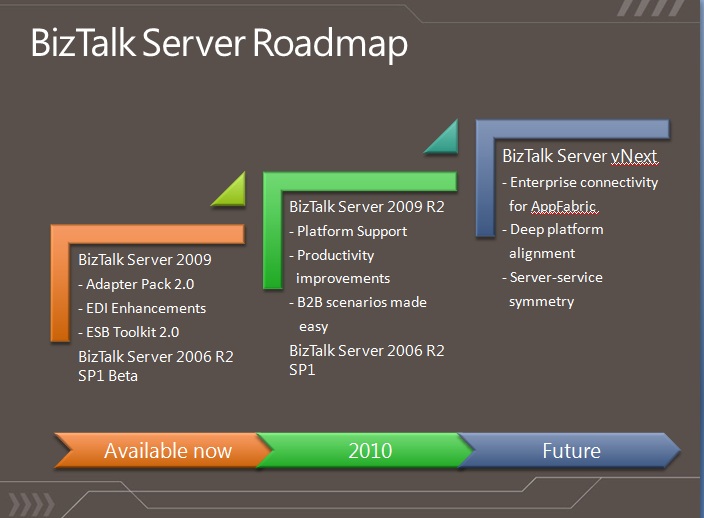Microsoft updates its enterprise ABC (Active Directory, BizTalk and Communications Server) roadmaps

Microsoft has released many of the products that officials promised earlier this year would be its biggest release wave in the company's history. But there are still a number of key Microsoft enterprise products in development which haven't gotten the attention (and ad dollars) that Windows 7 and Bing have, as of late.
At the company's Professional Developers Conference (PDC) right before Thanksgiving, Microsoft shared updates on some of these products. Here are some of the promised deliverables -- with due dates, when I could find them.
Active Directory: Microsoft is readying a number of Active Directory add-ons that company officials are counting on to provide a backbone for the three-screens-and-a-cloud vision that Microsoft execs love to tout. The company is working on what it calls Next Generation Active Directory (NGAD), which is a federation service more than it is a whole new version of Active Directory. The goal is to enable users to "federate across all our directories -- the phone, the PC and the cloud," said Identity Architect Kim Cameron. Microsoft took a first step toward enabling NGAD (which so far, has no public due date) by releasing to interested parties in mid-November a downloadable schema application programming interface (API), system.identity. In the nearer term, Microsoft is planning to deliver the near-final Release Candidate (RC) test build of Active Directory Federation Services 2.0 before the end of this year and deliver the final version within the first quarter of 2010, Cameron said. ADFS 2.0 is one component of Microsoft's "Geneva" identity platform. Microsoft released to manufacturing its Geneva framework piece (now known as Windows Identity Foundation) a week-plus ago.

Duet: Microsoft and SAP have been collaborating since 1995 to integrate Microsoft Office with SAP's back-end business-process software. The next phase for the "Duet" project between the two is to integrate SharePoint with SAP's data and processes. The newest member of the Duet family, known as Duet Enterprise for Microsoft SharePoint and SAP, is due out in the second half of 2010. The newest Due client will build on SharePoint 2010's Business Connectivity Services. The idea is to make SAP ERP tasks, such as order entry, richer by integrating them with SharePoint workflows and other collaborative services. From my conversation with Office Senior Vice President Kurt DelBene, it sounds like there are other SAP-Office team integrations in the works. It also sounds like Microsoft is talking to other third-party app vendors about similar Duet-style partnerships, though DelBene wasn't ready to name names.